Cluster Staff
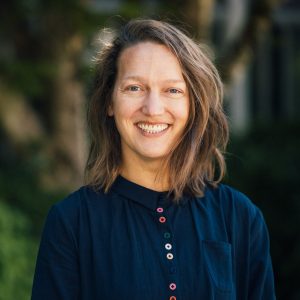
Tamara Mitchell (she/her), PI, Sound and the Humanities Research Cluster; Assistant Professor of Hispanic Studies (FHIS), @SpanglishTammy
Tamara Mitchell works at the intersection of politics and aesthetics in contemporary Latin American narrative fiction. She is presently working on a SSHRC-funded monograph entitled Sounds of the Capitalocene: Violence and Aurality in the Contemporary Mexican Novel, which analyzes literary aurality in recent fiction as a means of responding to and critiquing economic and ecological crises. She has published on sound and listening in peer-reviewed venues like Chasqui and the Revista Canadiense de Estudios Hispánicos. With Prof. Amanda M. Smith (University of California, Santa Cruz), she convenes the Latin American Sound Studies Working Group (2020-present) and is editing a special issue on Latin American Literary Aurality for the Revista de Estudios Hispánicos.
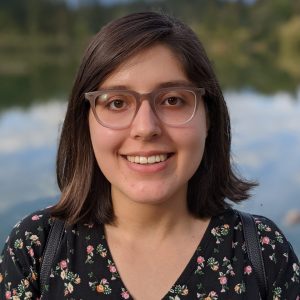
Sarah Revilla-Sanchez (she/her), PhD Student, Hispanic Studies; GRA, Sound and the Humanities Research Cluster
Sarah Revilla-Sanchez’s research focuses on gendered violence, contemporary Latin American fiction and artivism (art+activism), particularly feminist chants and songs in anti-violence protests in Mexico. She is currently thinking about the intersection of sound, silence, and affect as represented in literature. She is a research assistant in the Sound and the Humanities Research Cluster.
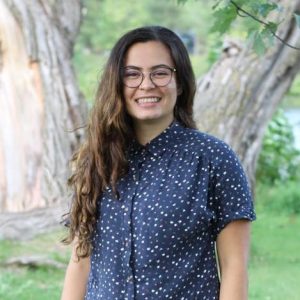
Pamela Zamora (she/her), PhD Candidate, Hispanic Studies; GRA, Sound and the Humanities Research Cluster
Pamela Zamora’s work examines contemporary Mexican and Central American literature. She is interested in how novels enact and portray literary listening to social crises in the region. Her dissertation project dwells on the unmet promises of the state to protect its citizens, silencing traditionally underrepresented groups (e.g., Indigenous communities, migrants, and women). She is currently working as a Graduate Research Assistant for the Sound and the Humanities Research Cluster. Her article on Salvadorian fiction and sonic violence in neoliberal times has been accepted to the Revista de Estudios Hispánicos special issue on Latin American Literary Aurality.
Cluster Affiliates
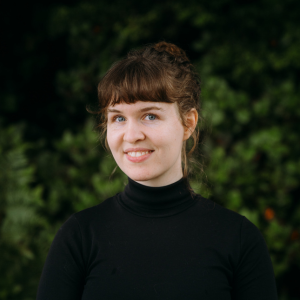
Ellie Berry (she/her), PhD Candidate, Theatre and Film, Cinema Studies
Ellie Berry is a PhD candidate in Cinema and Media studies at UBC. Her research focuses on the intersections of Sound, Deaf and Disability studies, her dissertation considering the sonic resonances and frictions of closed captions in film and media.
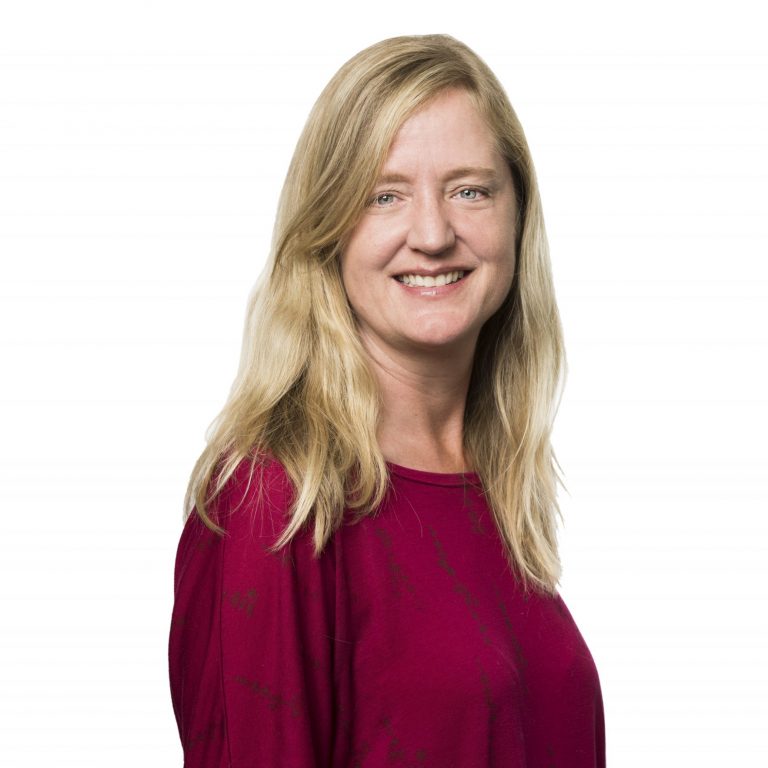
Lisa Coulthard (she/her), Professor of Film, Co-PI, Sound and the Humanities Research Cluster
Lisa Coulthard is Full Professor of Cinema and Media Studies in the Department of Theatre and Film at the University of British Columbia. She has published widely in the areas of cinematic sound, film violence, theory, and film-philosophy. She is currently working on an edited collection on vocality and media and a monograph on sound and violence.

Alex Fisher (he/him), Professor, School of Music
Alex Fisher is a Professor of Music in the UBC School of Music. A specialist in music, sound, and religious culture in early modern Germany, he is the author of Music and Religious Identity in Counter-Reformation Augsburg, 1580-1630 (Ashgate, 2004), and Music, Piety, and Propaganda: The Soundscapes of Counter-Reformation Bavaria (Oxford, 2014). His work appears in various journals, including the Journal of Musicology, Journal of the Royal Musical Association, Early Music History, the Journal for Seventeenth-Century Music, and Sixteenth Century Journal (forthcoming). His current research on soundscapes and confessional space in the Holy Roman Empire in the post-Reformation era is supported by the Social Sciences and Humanities Research Council of Canada.

Michele Koppes (she/her), Professor, Geography
Michele Koppes is a Professor of Geography and Director of the Landscapes of Climate Change Lab. She uses acoustic mapping to explore relationships to land in order to understand how the lives of the ice, mountains, rivers and people who dwell among them are intertwined. Since 2017, she has been collaborating with sound artist S. Ibarra on Water Rhythms, which explores stories of climate change as told by the ice and water. Their sound installations have debuted at various arts festivals, including the Asian Cultural Council Gala (NYC 2019), Counterflows Festival (Glasgow 2021), Onassis-Stegi Climate Culture Festival (Athens 2021), Arko Art Center (Seoul 2021), TED Countdown Summit (Edinburgh 2021), Exploratorium (San Francisco 2022), and Nature of Cities’ Reverberations exhibit (2023).
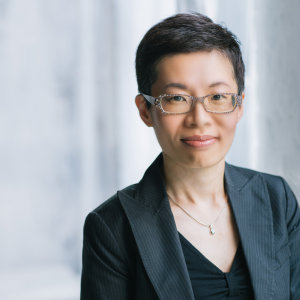
Hedy Law (she/her), Associate Professor of Musicology, UBC School of Music
Hedy Law is Associate Professor of Musicology at the University of British Columbia. She received her Ph.D. in Music Theory and History at the University of Chicago. She has published in Cambridge Opera Journal, the Opera Quarterly, Musique et Geste en France: De Lully à la Révolution, the Oxford Handbook of Music and Disability Studies, the Oxford Handbook of Music and Censorship, the Oxford Handbook on Music and the Body, and the collection of essays Noises, Audition, Aurality: History of the Sonic Worlds in Europe, 1500–1918. She co-authored an article on Beethoven’s song cycle An die ferne Geliebte for the journal CENTER: Architecture and Design in America. Her book, Music, Pantomime, and Enlightenment France, was published by Boydell & Brewer Press in October 2020.
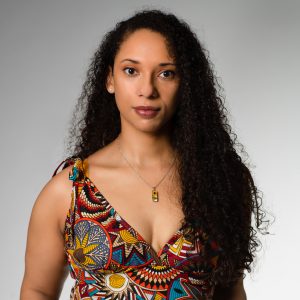
Alexis McGee (she/her), Assistant Professor, School of Journalism, Writing, and Media
Alexis McGee is an Assistant Professor of Writing Studies at the University of British Columbia. She received her Ph.D. (with certificates of concentration in Linguistics and Rhetoric & Composition) from the University of Texas at San Antonio. Her research interests include Black feminist (rhetorical) theory; Black rhetorics; language, and literacies; sound studies as well as rhetoric and composition theory and history. She is the past recipient of National Council of Teachers of English’s Early Educator of Color Leadership and Cultivating New Voices awards. Her work has been published in a number of journals. Her most recently publication, “Rereading Sor Juana’s Rhetorics: The Intersectional, Cultural Rhetorician” was published in Rhetoric Review. Her monograph From Blues to Beyoncé: A Century of Black Women’s Generational Sonic Rhetorics, is forthcoming with SUNY Press.
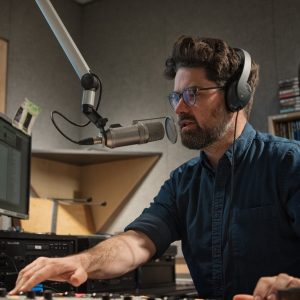
Duncan McHugh (he/him), Digital & Instructional Media Producer, Faculty of Land and Food Systems
Since 2006, Duncan has co-taught LFS 400, a podcasting/audio storytelling course at the UBC Faculty of Land and Food Systems, where he works as digital & instructional media producer. He is also a long-time volunteer at CiTR 101.9fm, where he hosts Duncan’s Donuts, a weekly music show and was a long term board member. He has also served as technical instructor at the UBC Graduate School of Journalism and provides campus-wide workshops in podcasting.
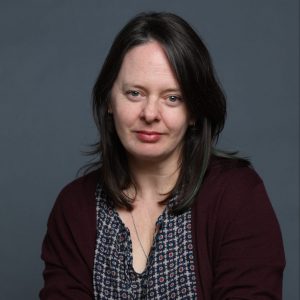
Jennifer Moss (she/her), School of Creative Writing
Jen Moss has worked in audio storytelling for over 20 years. She is the Co-founder and Chief Creative Officer of JAR Audio, a branded podcast company based in Vancouver, BC. She teaches Creative Writing for New Media and Creative Writing for Podcasting at UBC. She is interested in cross-genre and cross-departmental collaboration and in continually exploring how emerging technologies open new doorways for writers. Jen, who has a Master’s in Liberal Studies, has worked extensively in radio production for both CBC and Roundhouse Radio. She created dozens of audio documentaries for CBC Radio programs, such as Ideas, The Current, and North by Northwest. In addition, Jen was an interactive story producer on numerous award-winning interactive projects, including Bear 71 (NFB), Seven Digital Deadly Sins (The Guardian), Hyperlocal (CBC), Life on Hold (Al Jazeera), and The Last Hunt (NFB).
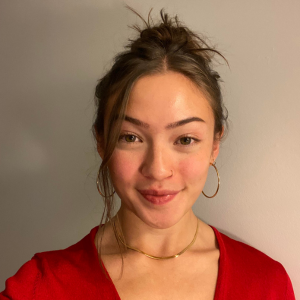
Anna Navarro (she/her), MA Student, Department of English Language and Literatures
Anna Navarro is an MA student in English at UBC. Her research focuses on diasporic archives, especially multimedia materials and ephemera
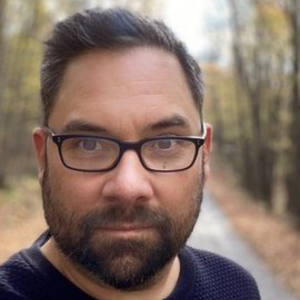
Dylan Robinson (he/him), Associate Professor of Ethnomusicology, Co-PI, Sound and the Humanities Research Cluster
Dylan Robinson is a xwélmexw (Stó:lō/Skwah) artist, curator and writer. From 2015-2022 he was the Canada Research Chair in Indigenous Arts at Queen’s University. Dr. Robinson’s curatorial work includes the international touring exhibition Soundings (2019-2025) co-curated with Candice Hopkins. His current research project xoxelhmetset te syewa:l, Caring for Our Ancestors, involves working with Indigenous artists to reconnect kinship with Indigenous life incarcerated in museums. His book, Hungry Listening (University Minnesota Press, 2020), examines Indigenous and settler colonial practices of listening, and was awarded best first book for the Native American and Indigenous Studies Association, Canadian Association for Theatre Research, and the Labriola Centre American Indian National Book Award.
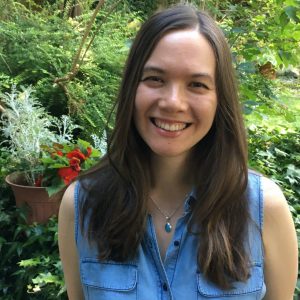
Rosanne Sia (she/her), Assistant Professor, Institute for Gender, Race, Sexuality, and Social Justice
Rosanne Sia works across Cold War cultural history, performance studies, critical race studies, and queer studies. Her book manuscript project focuses on women of Asian and Latinx descent who danced and sang on nightclub circuits in the early Cold War.

J. Logan Smilges (they/them), Assistant Professor of English Language and Literatures @jlsmilges

Siobhán Wittig McPhee
(she/her), Associate Professor of Teaching, Department of Geography
Cluster Affiliates Alumni
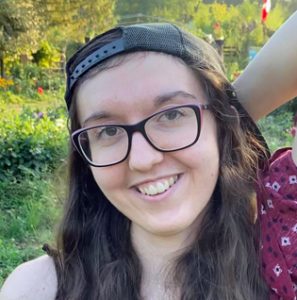
Tamar Hanstke (she/her), MA in Cinema and Media Studies

Emily Jean Leischner (she/her), PhD, Department of Anthropology
Emily is a settler, community-based researcher who studies and works with heritage institutions like museums and archives. In reciprocity with colleagues and friends from the Nuxalk First Nation, she researches the historical and contemporary appropriation of Nuxalk knowledge and heritage, collaborating on projects that reclaim and uphold Nuxalk sovereignty. Her dissertation examines extractive logics and settler colonialism in the capture, imprisonment and return of sound recordings of Nuxalk voices in museums and archives. She’s also the co-host of Using and Refusing Museums on Nuxalk Radio.